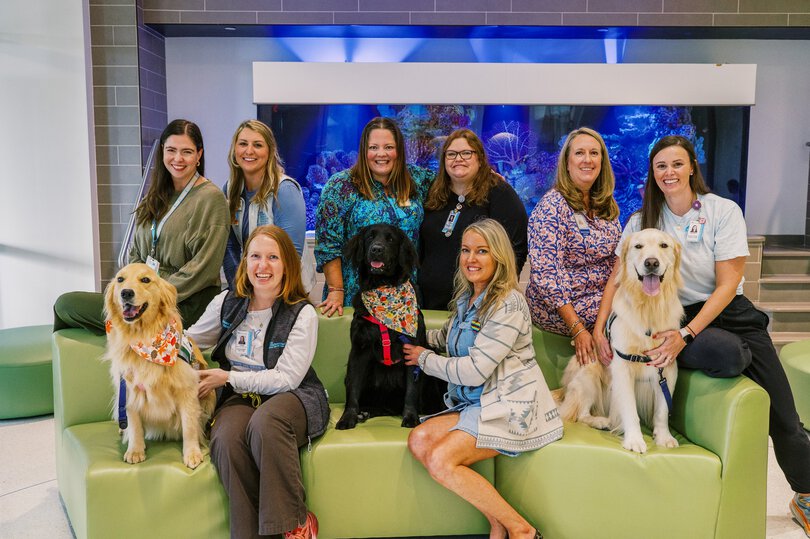Visit Prep List
This simple checklist will help you plan for your child’s stay

Thank you for choosing MUSC Children’s Health as the health care provider for your child. We do not take this choice for granted. It is our goal to provide you with the information that your family needs to feel comfortable as partners and decision-makers in your child’s care, whether you are with us for outpatient services or inpatient care. We call it Patient-and-Family-Centered Care.
MUSC Children’s Health delivers preventive and clinical care using evidence-based health care to children from fetal stage and tiny newborns through the teen years. While the flagship MUSC Shawn Jenkins Children’s Hospital is located in downtown Charleston, specialized pediatric care is now delivered through an expanding network of locations, making children’s health care more convenient for families.
At MUSC Health, it is our goal for you and your child to feel safe and cared for while at our hospital. To prepare for your child’s stay with us, our patient and family advisors have created these lists and guides for you.

Innovative care at MUSC Shawn Jenkins Children’s Hospital and the Pearl Tourville Women’s Pavilion integrates Children’s and Women’s Health.
The MUSC Shawn Jenkins Children’s Hospital and Pearl Tourville Women’s Pavilion is now open. This state-of-the-art building transforms how care is delivered to children and women, seamlessly integrating children’s care with obstetrical services. Our 250-bed pediatric hospital provides the most advanced care possible in more than 26 specialty areas. And as a Level 1 Trauma center, our pediatric emergency department specializes in providing emergency care for any serious injury or illness your child may experience at home, at school, or at play. Because the Medical University of South Carolina is a teaching medical center, when you or your child is a patient at MUSC, you may be cared for by people in training, such as:
Attending (M.D.) – an experienced doctor in charge of the medical team and the patient’s care. Attending physicians oversee the care of patients at MUSC Health. They are also teachers, helping to train future doctors. Any care that you receive from a Resident or Fellow doctor is under the watchful eye of an Attending.
Certified Nurse Midwives – persons who have completed nursing school and a graduate degree in midwifery. CNMs provide care to patients under the supervision of attending doctors.
Pediatric hospitalist (M.D.) – an attending doctor who specializes in the care of children in the hospital.
Fellow (M.D.) – doctors who have graduated from medical school and residency, and are seeking even more training in a specific specialty like women’s cancer or cardiology. They are ready to take board exams to become certified. Fellows’ training lasts 2-3 more years.
Resident (M.D.) – persons who have finished medical school. They are now doctors who are training in a specialty like Pediatrics or Obstetrics and Gynecology. This training lasts 4 years. Residents may provide care to patients with the oversight of a doctor with more experience – a Fellow or Attending.
Registered nurse (R.N.) – the nurse who cares for you in the hospital.
Nurse practitioner – an R.N. with advanced training in diagnosing and treating patients.
Nurse case manager – an R.N. who coordinates care with you and the team.
Nurse manager – an R.N. responsible for unit operations and supervision of unit employees. He or she can address any questions or concerns you might have.
Charge nurse – an R.N. in charge of the daily management of the unit, serving as a resource to other care team members and reporting to the nurse manager.
Medical or nursing student – students who have finished college and are studying to become nurses or doctors. They may help your health care team by asking you for information about your health. They will always be supervised by a nurse or doctor.
Chaplain – assists patients and families needing spiritual help or supportive counseling. He or she will listen to what is important to you and your family and show respect toward differences in cultures, beliefs, and lifestyles.
Child life specialist – has special training about children’s needs during illness and being away from home. Through play, learning, and support, the child life specialist minimizes stress and helps children, teens, and their families cope with health care visits.
Registered dietician (RD) – assists with a patient’s nutrition, and teaches patients and families about how eating well helps with health.
Environmental services – care team members who clean and sanitize patient rooms and public spaces.
Lactation consultant – an R.N. with special training who assists women with breastfeeding and pumping for their babies.
Occupational therapist (OT) – a therapist who helps patients make the most of their self-care skills.
Patient care technician (PCT) – a person trained to help nurses provide patient care.
Pharmacist (Pharm. D.) – a professional who helps the health care team decide which medicines are best for each patient. They also teach about medicines and how to take them so they work best.
Physical therapist (PT) – a therapist who uses exercise, therapy, and equipment to improve movement and strength.
Respiratory therapist (RT) – a therapist trained to assess and treat patients with breathing or lung problems.
Social Worker – a professional who finds resources to help families cope with issues related to their loved one’s illness.
Speech therapist – a therapist who works with patients who have trouble with speech and swallowing.


